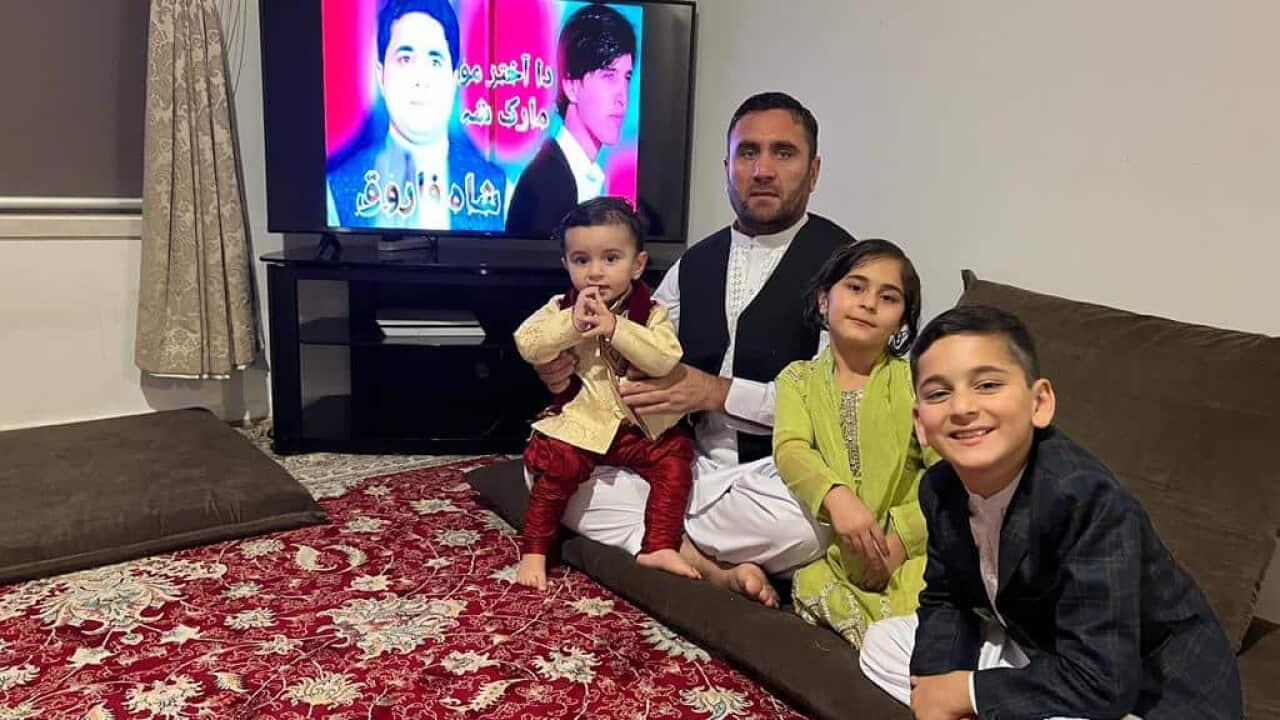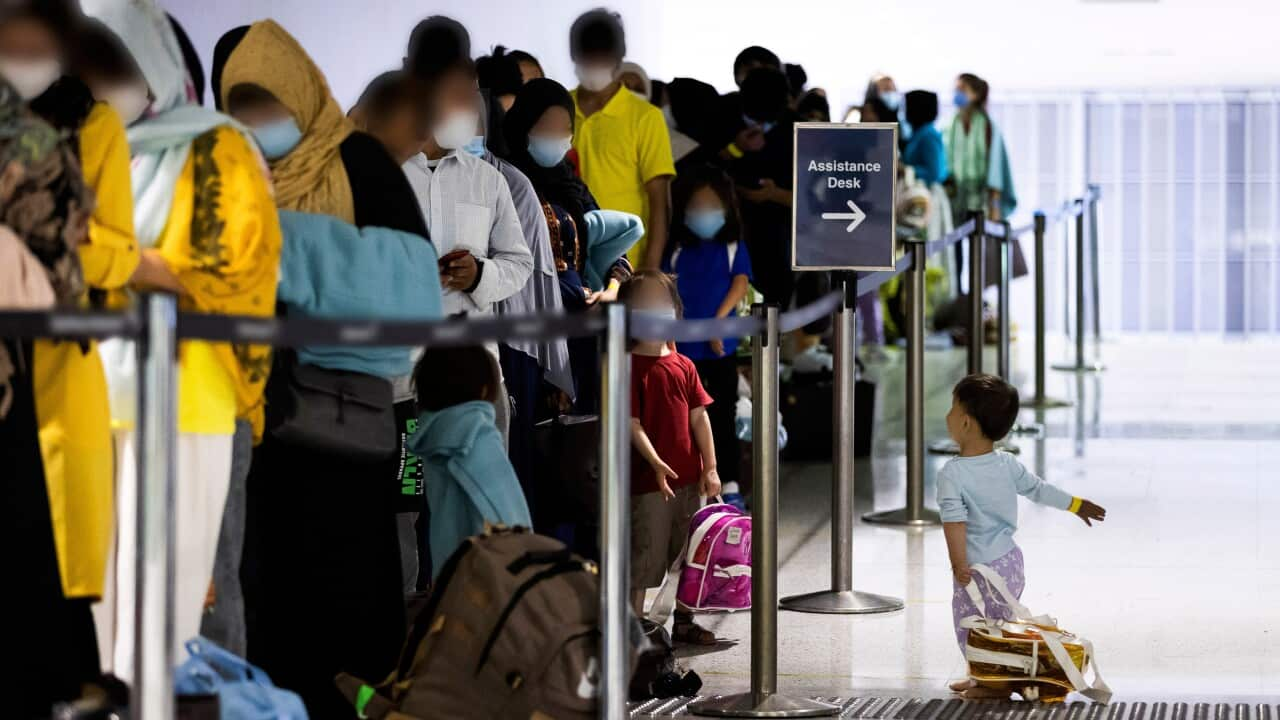Highlights:
- Eid is an important festival celebrated by Muslims around the world.
- Afghan evacuees in Australia say the event helps them keep their culture alive.
- Celebrating Eid without friends and family is a ‘challenging experience’.
Sayed Wahdat Saddat is a former interpreter who worked alongside Australian forces in Afghanistan between 2009 and 2010. He waited several years to receive an Australian visa, but he was evacuated following the collapse of Kabul in August 2021.
Mr Saddat is currently residing in Melbourne with his wife and children and is grateful for the opportunity to live in Australia.
“We have been here for about a year and a half and I am very happy that my children have learned the [English] language and understand how to communicate,” Mr Saddat said.
"I thank the Australian government, which helped us a lot [since arrival] and their assistance still continues."

Sayed Wahdat Saddat (left) with his family members inside a Royal Australian Air Force Plane during the evacuation process from Afghanistan. Credit: Supplied
‘Eid is not the same’
There are two main Eids in the Islamic calendar: Eid al-Fitr and Eid al-Adha. Eid al Fitr is celebrated at the end of Ramadan, a month of fasting and spiritual reflection. Also called the ‘smaller Eid’, it is celebrated for three days.
While Mr Saddat enjoys his new life in Australia, he said there is a big difference in how Eid is observed.
"It is obvious that there is a big difference between Eid here [in Australia] and there [Afghanistan].
When we celebrate Eid in Afghanistan, when you go out of the house, it is everyone's Eid. We meet everyone and everyone wears colourful clothes and it is a public holiday.Sayed Wahdat Saddat
“Eid is for three days. We go to our relatives' houses, visit important places and eat special foods and sweets, which are not available here.”
“Here [in Australia] everything is limited to the mosque. When we do go out of the mosque, we do not feel it is like Eid because everyone is going to work and busy.”

Sayed Wahdat Saddat with his son at Eid prayers in Melbourne. Credit: Supplied
“Our immediate family is separated from us. As we cannot go back [to Afghanistan] because of the danger, I request the Australian government to help us and grant visas to our close family members, such as brothers and sisters.”
After the fall of Afghanistan into the Taliban’s hands, the Australian government announced it would provide 31,500 visas for Afghan nationals through its humanitarian and family visa program over a period of four years.
According information on the Department of Home Affairs website, nearly 40,000 applications were lodged between 17 August 2021 and 31 December 2022, and about 86 per cent of these applications have been registered and acknowledged.
In December 2022, a department spokesperson told SBS Pashto that over 8,000 refugee and humanitarian visas had been granted to Afghan citizens between 1 July 2021 and 11 November 2022.

An Australian rescue flight prior to evacuation from Kabul. Credit: Department of Defence
‘No one visited our house’
Mahnaz Abbasi worked for five years as a community educator with a non-government organisation in Afghanistan which helps children. She was also a member of the women’s basketball team in Mazar- I-Sharif.
Ms Abbasi, her husband and two children were evacuated by the Australian government in August 2021. She said that after arriving in Australia, she experienced culture shock and celebrating Eid was “a totally new experience”.

Mahnaz Abbasi with her husband and two children a few months after their arrival in Australia. Credit: Supplied
Last year, which was her first Eid in Australia, she prepared everything as she would in Afghanistan expecting that a few families would visit their house.
But no one came.
“We knew two or three families. We prepared everything for Eid and were expecting that they might visit our house. We bought new clothes but no one visited,” she said.
“We also decided not to visit any houses and did not know what to do [on the first Eid].”
“If my mother or siblings were here [in Australia], we would be very happy. Our Eid would be more colourful. Our children would go to their grandmother's house and learn the feeling of being together.”
‘Forced to leave home and families’
According to the Department of Foreign Affairs and Trade, Australia was able to evacuate around 4,100 individuals via 32 flights from Kabul on 18-26 August 2021 - one of the largest humanitarian airlift operations in Australia’s history.
Bassir Qadiri is the founder of the Bakhtar Community Organisation, which has been providing support to Afghan refugees and asylum seekers for over six years, particularly those who were evacuated from Afghanistan in 2021.

Bassir Qadiri, founder of the Bakhtar Community Organisation. Credit: Supplied
“Eid celebrations may be different as they are away from their families and communities. Many have lost loved ones, and their lives have been turned upside down,” he said.
"The psychological impact of the trauma and uncertainty is immense, and we are working hard to provide them with the necessary support and assistance to help them navigate this difficult time.”
[Eid] is a time of year when families and friends come together to celebrate, and for those who are newly arrived, they may be feeling isolated and alone.Bassir Qadiri, founder of the Bakhtar Community Organisation
While many evacuees do not have family and friends in Australia to celebrate Eid with, there are organisations providing support.
Mr Qaderi said the Bakhar Community Organisation has planned an Eid program for new arrivals aimed at preserving a sense “of identity and belonging”.
“Our Eid program will include cultural activities, traditional food, and socialising with other members of the community. It will also provide a platform for our community to connect with each other and build new friendships and relationships,” he added.
“We hope that this will help to alleviate some of the feelings of isolation and disconnection that our clients may be experiencing and provide them with a sense of community and support during their resettlement journey.”
‘Keeping our culture alive’
Roya Dadras served as the spokesperson for the Ministry of Women’s Affairs in Afghanistan for about six years. When the Taliban entered Kabul, Ms Dadras was in her office planning a meeting to discuss the challenges faced by Afghan women.
After the collapse of Afghanistan, Ms Dadras repeatedly attempted to enter Kabul Airport and leave the country. Unable to attain this goal, she fled to neighbouring Pakistan.

Roya Dadras (second from left) sits alongside two other government officials on a panel discussion at Zan TV in Afghanistan. Credit: Supplied
“I fought death for a month, but by the grace of God, I got out of there and went to Pakistan. I stayed there for six days and when the official paperwork was finished, the Australian government helped to bring us to Australia. We are really grateful they brought us to Australia.”
Ms Dadras, her husband and four kids were evacuated about one and a half years ago and are currently living in Brisbane.
Having left everything behind in Afghanistan, she said Eid is an opportunity to feel closer to home.
“Even though Eid in Australia is not like in Afghanistan, we want to preserve our culture,” she said.
“I start my preparation for Eid days in advance by cleaning the home. Also, the kids need to know that Eid is coming so I buy new clothes for them.”
“On the days of Eid, we eat the sweets we have prepared. We go to our relatives' houses and invite them to our house to celebrate Eid together.”







